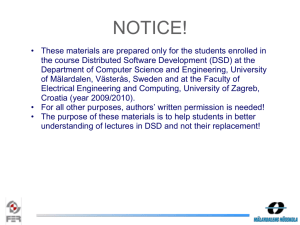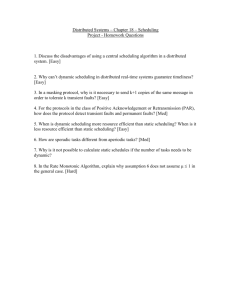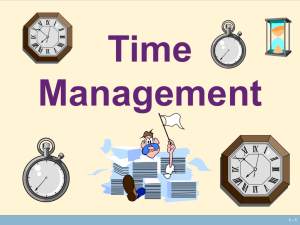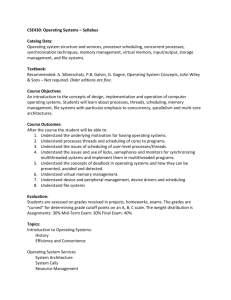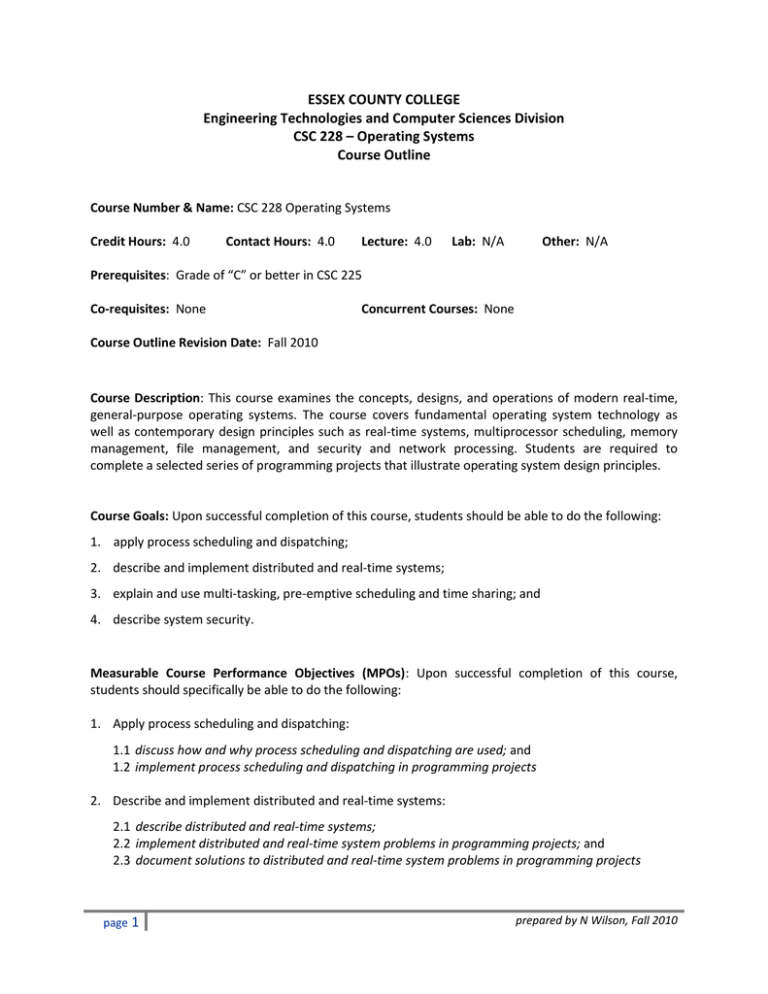
ESSEX COUNTY COLLEGE
Engineering Technologies and Computer Sciences Division
CSC 228 – Operating Systems
Course Outline
Course Number & Name: CSC 228 Operating Systems
Credit Hours: 4.0
Contact Hours: 4.0
Lecture: 4.0
Lab: N/A
Other: N/A
Prerequisites: Grade of “C” or better in CSC 225
Co-requisites: None
Concurrent Courses: None
Course Outline Revision Date: Fall 2010
Course Description: This course examines the concepts, designs, and operations of modern real-time,
general-purpose operating systems. The course covers fundamental operating system technology as
well as contemporary design principles such as real-time systems, multiprocessor scheduling, memory
management, file management, and security and network processing. Students are required to
complete a selected series of programming projects that illustrate operating system design principles.
Course Goals: Upon successful completion of this course, students should be able to do the following:
1. apply process scheduling and dispatching;
2. describe and implement distributed and real-time systems;
3. explain and use multi-tasking, pre-emptive scheduling and time sharing; and
4. describe system security.
Measurable Course Performance Objectives (MPOs): Upon successful completion of this course,
students should specifically be able to do the following:
1. Apply process scheduling and dispatching:
1.1 discuss how and why process scheduling and dispatching are used; and
1.2 implement process scheduling and dispatching in programming projects
2. Describe and implement distributed and real-time systems:
2.1 describe distributed and real-time systems;
2.2 implement distributed and real-time system problems in programming projects; and
2.3 document solutions to distributed and real-time system problems in programming projects
page 1
prepared by N Wilson, Fall 2010
Measurable Course Performance Objectives (MPOs) (continued):
3. Explain and use multi-tasking, pre-emptive scheduling and time sharing:
3.1 define multi-tasking, pre-emptive scheduling, and time sharing;
3.2 discuss the problems associated with multi-tasking, pre-emptive scheduling, and time sharing;
3.3 discuss the solutions used by various operating systems to address the problems associated with
multi-tasking, pre-emptive scheduling, and time sharing; and
3.4 implement the solutions used by various operating systems to address the problems associated
with multi-tasking, pre-emptive scheduling, and time sharing in programming projects
4. Describe system security:
4.1 describe issues of system security; and
4.2 suggest ways to address issues of system security
Methods of Instruction: Instruction will consist of lectures, laboratory demonstrations and assignments,
and programming examples.
Outcomes Assessment: Exam questions are blueprinted to course objectives. Checklist rubrics are used
to evaluate the programming projects for the presence of course objectives. Data is collected and
analyzed to determine the level of student performance on these assessment instruments in regards to
meeting course objectives. The results of this data analysis are used to guide necessary pedagogical
and/or curricular revisions.
Course Requirements: All students are required to:
1. Maintain regular attendance and take part in class discussions.
2. Complete assigned homework and programming projects on time.
3. Take all exams as scheduled.
Methods of Evaluation: Final course grades will be computed as follows:
Grading Components
Homework, class participation and attendance
% of
final course grade
10%
Students must practice skills on their own by doing homework
to be able to master course objectives. Homework assignments
relate to these objectives. Attendance and class participation
are necessary for students to benefit from the guidance of the
instructor.
3 or more programming projects
35%
Programming projects will show evidence of the extent to which
students meet course objectives. Students should show that
they have synthesized a combination of concepts.
page 2
prepared by N Wilson, Fall 2010
Methods of Evaluation (continued):
Grading Components
Midterm Exam
% of
final course grade
25%
The Midterm Exam will provide evidence of the extent to which
students have mastered course objectives and synthesize
material taught in the first half of the course.
Final Exam
30%
The Final Exam will provide evidence of the extent to which
students have mastered course objectives and synthesize
material taught in the second half of the course.
Academic Integrity: Dishonesty disrupts the search for truth that is inherent in the learning process and
so devalues the purpose and the mission of the College. Academic dishonesty includes, but is not
limited to, the following:
plagiarism – the failure to acknowledge another writer’s words or ideas or to give proper credit
to sources of information;
cheating – knowingly obtaining or giving unauthorized information on any test/exam or any
other academic assignment;
interference – any interruption of the academic process that prevents others from the proper
engagement in learning or teaching; and
fraud – any act or instance of willful deceit or trickery.
Violations of academic integrity will be dealt with by imposing appropriate sanctions. Sanctions for acts
of academic dishonesty could include the resubmission of an assignment, failure of the test/exam,
failure in the course, probation, suspension from the College, and even expulsion from the College.
Student Code of Conduct: All students are expected to conduct themselves as responsible and
considerate adults who respect the rights of others. Disruptive behavior will not be tolerated. All
students are also expected to attend and be on time for all class meetings. No cell phones or similar
electronic devices are permitted in class. Please refer to the Essex County College student handbook,
Lifeline, for more specific information about the College’s Code of Conduct and attendance
requirements.
page 3
prepared by N Wilson, Fall 2010
Course Content Outline: based on the text Operating Systems, 3rd edition, by Deitel, Deitel and
Choffnes; published by Pearson/Prentice Hall, 2004
Week
(3 meetings
@ 80 minutes)
Topic/Chapter
1
Class Overview – Class syllabus, office hours, policies & requirements;
Introduction to Operating Systems – history, hardware & software
concepts, operating system environments, operating system
components and goals, operating system architectures
Homework – Exercises 1.1 – 1.11, p 46
Hardware Concepts – 2.3 Hardware (mainboards, processor
components, clocks, memory hierarchy, main memory, secondary
storage, buses, direct memory access (DMA) & peripherals), 2.4
Hardware Support for Operating Systems (processor – user mode,
kernel mode, privileged instructions, memory protection and
management & interrupts and exceptions, timers and clocks,
bootstrapping & plug and play), 2.5 Caching and Buffering
Software Concepts – 2.6 Software (machine language and assembly
language, interpreters and compilers, high-level languages, structured
programming & object-oriented programming), 2.7 Application
Programming Interfaces, 2.8 Compiling, Linking and Loading, 2.9
Firmware, 2.10 Middleware
Homework – Exercises 2.1 – 2.17, pp 101 – 102
2
Process Concepts – 3.1 Definition of Process, 3.2 Process States, 3.3
Process Management (process states and state transitions, process
control blocks, process operations, suspend and resume & context
switching)
Process Concepts (continued) – 3.4 Interrupts (interrupt processing &
interrupt classes), 3.5 Inter-process Communication (signals & message
passing)
Discuss Basic Tools to Manage Windows XP
Homework – Exercises 3.1 – 3.16, pp 139 – 141, Windows 2000/XP
Treasure Hunt (handout), Display Directory Program (handout) & Text
Search Program (handout)
Windows & Linux Overviews – 21.1 – 21.5 Windows Overview, 20.1 –
20.3 Linux Overview
Programming Project #1 Utility assigned
page 4
prepared by N Wilson, Fall 2010
Week
(3 meetings
@ 80 minutes)
3
Topic/Chapter
Thread Concepts – 4.2 Definition of Thread, 4.4 Thread States, 4.5
Thread Operations, 4.6 User-Level Threads & Kernel-Level Threads
Thread Concepts (continued) – 4.9 Linux Threads, 4.10 Windows XP
Threads, 20.4 – 20.5 Linux Kernel, Process and Thread Organization,
21.6 Windows XP Process and Thread Management
Basic Tools to Manage Linux
Homework – Exercises 4.1 – 4.4 & 4.9, Linux Treasure Hunt (handout,
optional)
4
Concurrency – 5.2 Mutual Exclusion, 5.6 Semaphores, 7.1 Definition of
Deadlock, 7.2 Examples of Deadlock (traffic deadlock, simple resource
deadlock, spooling system deadlock & dining philosophers example –
handout)
Concurrency (continued) – 7.3 Indefinite Postponement, 7.4 Resource
Concepts, 7.5 Four Necessary Conditions for Deadlock
Homework – Traffic Problem (handout)
Concurrency (continued) – 7.6 Deadlock Solutions, 7.7 Deadlock
Prevention, 7.8 Deadlock Avoidance, 7.9 Deadlock Detection, 7.10
Deadlock Recovery
Discuss Basic Tools to Manage Linux
Homework – Exercises 7.1 – 7.4 & 7.9, p 323
Programming Project #2 Dining Philosophers assigned
5
Processor Scheduling – 8.2 Processor Scheduling (scheduling levels &
preemptive versus non-preemptive scheduling), 8.5 Scheduling
Objectives, 8.6 Scheduling Criteria
Scheduling Algorithms – 8.7 Scheduling Algorithms (FIFO scheduling,
round-robin (RR) scheduling, shortest-process-first (SPF) scheduling,
highest-response-ratio-next (HRRN) scheduling & shortest-remainingtime (SRT) scheduling)
Scheduling Algorithms – 8.7 Scheduling Algorithms (continued) (multilevel feedback queues & fair share scheduling), 8.8 Deadline Scheduling,
8.9 Real-Time Scheduling
Discuss User Management within Windows and Linux
Programming Project #3 Barbershop assigned
page 5
prepared by N Wilson, Fall 2010
Week
(3 meetings
@ 80 minutes)
6
Topic/Chapter
Memory Organization and Management – 9.2 Memory Organization,
9.3 Memory Management, 9.4 Memory Hierarchy, 9.5 Memory
Management Strategies, 9.7 Single-User Contiguous Memory Allocation,
9.8 Fixed Partition Multiprogramming, 9.9 Variable Partition
Multiprogramming
Virtual Memory Organization – 10.2 Virtual Memory: Basic Concepts,
10.3 Block Mapping, 10.4 Paging, 10.5 Segmentation
Virtual Memory Management – 11.2 Locality, 11.3 Demand Paging, 11.4
Anticipatory Paging, 11.5 Page Replacement Strategies
7–8
Midterm Exam Review (handout)
Midterm Exam
Secondary Storage, Files and Databases – 12.3 Moving Head Disk
Storage, 12.4 Why Disk Scheduling is Necessary, 12.5 Disk Scheduling
Strategies
Secondary Storage, Files and Databases (continued) – 12.8 Caching and
Buffering, 12.9 Disk Performance Techniques, 12.10 RAID
File and Database Systems – 13.2 Data Hierarchy, 13.3 Files, 13.4 File
Systems, 13.5 File Organization, 13.6 File Allocation, 13.8 File Access
Control, 13.11 File Servers and Distributed Systems, 13.13 Database
Systems
9 – 10
15.6 Multiprocessor Scheduling,
Multiprocessor Mutual Exclusion
15.8
Load
Balancing,
15.9
11 – 12
Introduction to Networking – 16.2 Network Topology, 16.3 Network
Types, 16.4 TCP/IP, 16.9 Client Servers
Networking Labs
13 – 14
Distributed Processing – 17.2 Attributes of Distributed Systems, 17.3
Communications in Distributed Systems, 17.4 Synchronization
Distributed Processing (continued) – 17.5 Mutual Exclusion, 17.6
Deadlock
Client/Server – 18.2 Distributed File Systems, 18.3 Multicomputer
Systems, 18.5 Peer-to-Peer Distributed Computing
15
Security – Security in Windows, Security in Linux
Final Exam
page 6
prepared by N Wilson, Fall 2010



